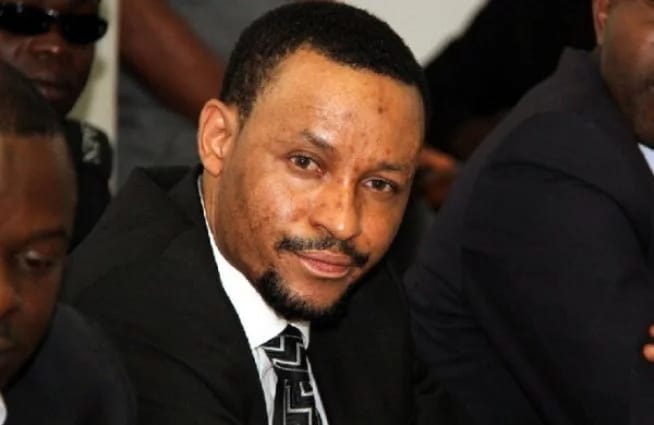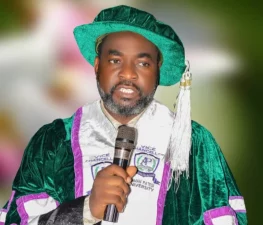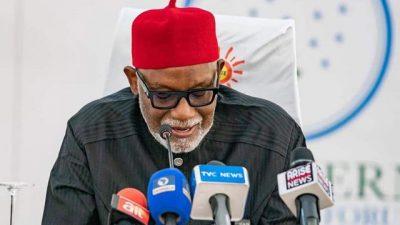The Code of Conduct Tribunal (CCT), which recently adjourned indefinitely in Abuja, proceedings on the non assets declaration charge pending against the suspended Chief Justice of Nigeria (CJN), Justice Walter Onnoghen, has fixed February 4 to resume the trial.
The Mallam Danladi Umar-led Tribunal, in a statement on Thursday in Abuja, disclosed that the decision to resume the trial was based on a request by the Federal Government.
It said the FG had in a letter that was signed by two legal officers at the Code of Conduct Bureau, CCB, Musa Ibrahim Usman and Fatima Danjuma Ali, applied for continuation of hearing on the charge against Onnoghen.
Onnoghen, who was last Friday suspended from office by President Muhammadu Buhari, is facing a six-count charge bothering on his alleged failure to declare his assets as prescribed by the law.
He was in the charge marked CCT/ABJ/01/19, equally accused of maintaining five separate foreign bank accounts, in breach of the code of conduct for public office holders.
In the statement that was signed by the Head, Press & Public Relations, at the CCT, Mr. Ibraheem Al-Hassan, FG, via the letter it sent through the CCB on Wednesday, drew attention of the Mr. Umar’s three-member panel to a ruling of the Abuja Division of the Court of Appeal, which cleared the coast for Onnoghen’s trial to proceed.
According to Al-Hassan, FG’s request read in part: “The above subject refers. This case came up for hearing of preliminary objection to the jurisdiction of the Tribunal on the 28th of January, 2019 but the Tribunal could not proceed due to the pendency of the case at the Court of Appeal.
“However, in the wake of this afternoon, 30th January, 2019 the Court of Appeal has thrown out the appeal.
“Consequently on the above, we urge the Honourable Tribunal to give us a date for resumption of the trial subject to the convenience of the Tribunal, most obliged my Lord”.
The appellate court had in a unanimous decision by a three-man panel led by Justice Abdul Aboki, declined Onnoghen’s request for his trial to be temporarily suspended, pending the determination of an appeal he lodged to challenge the competence of the charge and the procedure adopted by the CCT.
In the appeal he lodged on January 15, the suspended CJN, who had on two occasions, declined to appear before the CCT to enter his plea to the charge, contended that the Mr.Umar-led tribunal erred in law when it decided to hear the preliminary objection he filed to quash the charge, alongside a motion FG filed to secure and order to remove him as both the CJN and Chairman of the National Judicial Council, NJC.
Onnoghen insisted that it was wrong for the tribunal to hear and determine FG’s motion when its jurisdiction to entertain the substantive charge was being challenged.
He therefore prayed the appellate court to set-aside the decision of the CCT as contained in a ruling its Chairman delivered on January 14.
Meanwhile, before the appeal could be heard, Justice Onnoghen, on January 18, filed a motion wherein he prayed the appellate court to stay further proceedings in the case against him.
Based on the motion, the Appeal Court, on January 24, ordered the Mr. Umar-led CCT panel to suspend further proceedings in the matter to enable it to consider Onnoghen’s request.
The order of the court came barely 24 hours after FG secured an ex-parte order from the tribunal, which gave President Buhari the nod to suspend Onnoghen and swear-in the most senior jurist of the Supreme Court, Justice Tanko Muhammad, as the Acting CJN.
At its resumed sitting on Wednesday, the appellate court vacated its initial order that stopped the CCT from taking further steps in Onnoghen’s trial.
The appellate court held that granting the suspended CJN’s motion would amount to a “fundamental interruption” of a criminal proceeding before the CCT. It noted that Onnoghen himself had in a judgment he delivered in a case involving a firm owned by former National Publicity Secretary of the Peoples Democratic, PDP, Chief Olisa Metuh, Destra Investment Limited, banned the grant of stay of proceeding in criminal matters.
Justice Aboki further recalled that the suspended CJN had in another case that involved the Senate President, Dr. Bukola Saraki, identified the CCT as a special court with quasi-criminal jurisdiction.
He maintained that section 306 of the Administration of Criminal Justice Act, 2015, expressly forbade courts from granting orders to stay proceedings in criminal cases.
“We cannot run away from the fact that the CCT which has quasi-criminal jurisdiction, does not have an option than to abide and apolitical the criminal laws in all proceedings before it”, Justice Aboki added.
Consequently, the appellate court dismissed Onnoghen’s appeal, stressing that the order from stay of proceedings he requested for could not be granted as a matter of cause.
“An applicant must convince the court that grant of such order will be in the interest of justice”, the court held, saying there was no “special or exceptional circumstance”, to warrant the suspension of the case pending against Onnoghen before the CCT.
“The Applicants motion for an order for stay of proceeding is hereby refused”, Justice Aboki ruled.
Nevertheless, the appellate court fixed February 4 to hear the substantive appeal the suspended CJN filed to challenge decision of the CCT to hear his preliminary objection alongside FG’s motion to remove him from office.
It will be recalled that the CCT had last Monday, adjourned Onnoghen’s trial sine-die (indefinitely) to await the outcome of the appellate court’s ruling.
Onnoghen had through his team of lawyers led by Chief Wole Olanipekun, SAN, contended that his objection and FG’s motion were mutually exclusive, and as such, could not be heard together.
He argued that the tribunal ought to firstly determine whether or not it has the requisite jurisdiction to handle the charge against him, before it could proceed to hear any other application.
Specifically, Justice Onnoghen faulted the competence of his trial before the CCT on the premise that FG failed to allow the NJC to investigate the allegations against him, before it proceeded to prefer a criminal charge against him.
Aside the instant appeal, Justice Onnoghen had also lodged another appeal to challenge the ex-parte order the CCT issued for his suspension.
In the four grounds of appeal he filed on Tuesday, Onnoghen, argued that the CCT erred in law by granting an ex-parte order for his removal, even it had yet to determine whether or not it has the jurisdiction to try him.
He therefore applied for, “An order setting aside the order of the tribunal made on the 23rd of January, directing the Appellant to step aside as the Chief Justice of Nigeria and a further order that the President of the Federal Republic of Nigeria takes all necessary measures to swear-in the most senior Justice of the Supreme Court of Nigeria as Acting Chief Justice of Nigeria and Chairman of the National Judicial Council”.
More so, the appellant maintained that “the exercise of powers over the motion ex-parte without first determining the jurisdiction of the tribunal amounted to unlawful exercise of jurisdiction and therefore void”.
The NJC which is the organ of the judiciary with the statutory mandate to discipline judicial officers, had on Tuesday, handed the suspended CJN seven days to respond to the allegations against him.
The legal body equally gave the same number of days to the Acting CJN, to adduce reasons why disciplinary actions should not be taken against him for presenting himself to President Buhari to be sworn-in to replace Onnoghen.
Likewise, the Council, forwarded a petition accusing the CCT Chairman of engaging in reckless abuse of his judicial powers by granting the ex-parte order that led to Onnoghen’s suspension, to the Federal Judicial Service Commission, FJSC.




